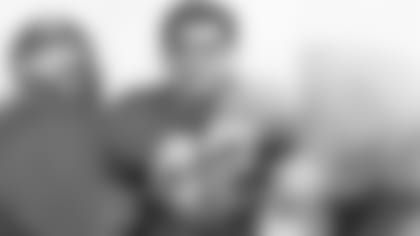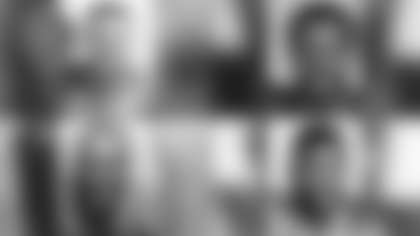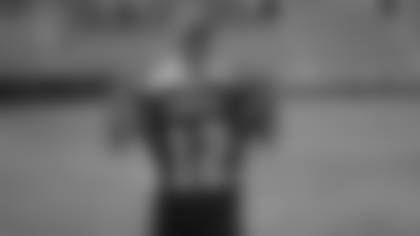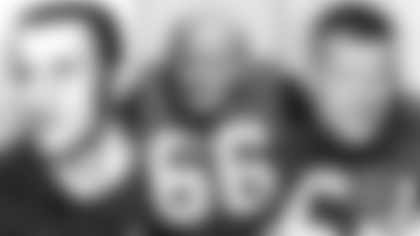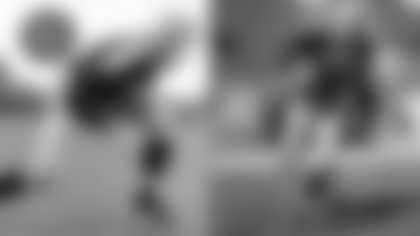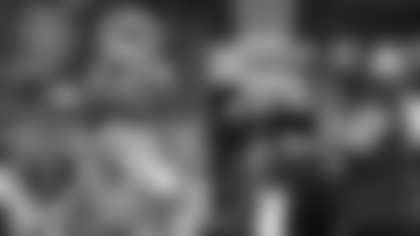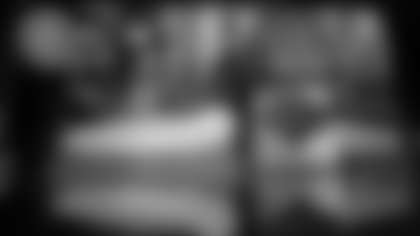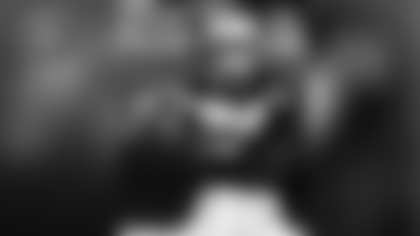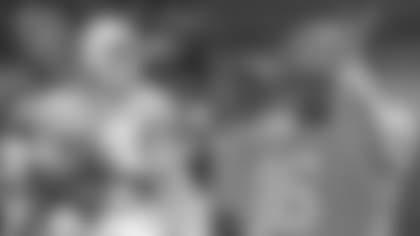Cliff Christl started gathering oral histories with former Packers and others associated with the team in 2000 and will continue to gather them as Packers historian. Excerpts from those interviews will be periodically posted at www.packers.com
Al Carmichael played for the Packers from 1953 to 1958 and was best remembered for his record-setting, 106-yard kickoff return in 1956. A first-round draft choice in 1953, Carmichael played mostly right halfback in a three-back set, but made his biggest impact returning kickoffs and punts. He led the Packers in kickoff returns in five of his six seasons and in punt returns three times. He also led the NFL in kickoff returns in 1955 with a 29.9 average. On Oct. 7, 1956, his 106-yard return against the Chicago Bears at old City Stadium set an NFL record that stood for 51 years. Although twice tied, the record wasn't broken until Ellis Hobbs of New England returned a kickoff 108 yards in 2007. Carmichael's return stood as a Packers record for 55 years. Randall Cobb finally broke it with a 108-yard return in 2011. When Carmichael's career in Green Bay ended, he held NFL records for most career kickoff returns and most career kickoff return yardage. Carmichael played in 68 games for the Packers before being waived on Aug. 26, 1959, a month into Vince Lombardi's first training camp. In 1960, when the American Football League was formed, Carmichael signed with Denver and played two more seasons. He was inducted into the Packers Hall of Fame in 1974.
On his 106-yard kickoff return: "All I remember about it was I went up the middle, broke to the left and went up the sideline. In later years, I went back there to be inducted into the Green Bay (Packers) Hall of Fame. And in there, the Hall of Fame building, they ran famous plays and that particular run was in there. I swear, I must have been hit five or six times. I never realized it. I had no idea I had gone that far. I was elated I had made a touchdown. But I didn't realize until the game was over that I had gone that far."
On any backstories to the play: "Normally, we're reprimanded if we run it out deep in the end zone. But I had gotten in an argument with a coach (Lisle Blackbourn). He and I had words in the locker room and I came out kind of mad about everything. I said, 'If I go back on a kickoff, I don't care where it goes, I'm going to run out.' The other back, I think it was Jack Losch, kept warning me not to do it and I decided on it anyway. The interesting thing was that as I was stepping back with my right foot, I thought I had stepped over the end line. I looked down, looked at the referee and he motioned it was legal. So I took off."
On the Packers-Bears rivalry in the 1950s and Bears' enforcer Ed Sprinkle, a defensive end: "Gib Dawson was a halfback (in 1953) and they told us not to swing close to him because he had a method of upper-cutting you and hooking you under the chin. That was allowed in those days. A lot of things were allowed in those days. But Dawson swung too close and Sprinkle got him under the chin. The poor guy (Dawson) pulled two hamstrings and he could hardly walk thereafter. He could never do much after that. It pretty much ruined his career."
On Gene Ronzani, his head coach as a rookie: "Having only played under him one year, he seemed kind of lax. He wasn't as much of a disciplinarian as Lisle Blackbourn. Blackbourn came in and it was a real change. But Blackbourn had to build a team. He had to beef up the offensive and defensive lines. By the time (Vince) Lombardi came in, he had a lot of the players that Blackbourn had drafted."
On co-coaches Hugh Devore and Scooter McLean running the team for the final two games in 1953 after Ronzani was fired: "There was a lot of chaos. The players kind of lost heart. I think the coaching staff kind of lost heart. It was, 'Let's play the games and get them over with.'"
On Blackbourn, his coach from 1954-57: "He was a pretty good coach. He had an eye for talent."
On McLean, backfield coach from 1951-57 and then his head coach during the disastrous 1-10-1, 1958 season: "As an assistant coach, he chummed around with a lot of the players. Then when he took over as head coach, he still fraternized with the players. That doesn't go over. You have to maintain control and discipline. When you fraternize, they don't have as much respect for you. It's like the military where you have the enlisted men and the officers. He'd play cards with them, drink beer with them coming back from games. (The players) did things behind his back. There wasn't much respect. Kidding around, joking. Guys were getting away with too much."
On training camp under McLean: "The workouts weren't very hard. Everything was very lackadaisical."
On the Packers' 56-0 loss to the Baltimore Colts in 1958: "I think the thing that broke the camel's back was that vicious game in Baltimore. From that point on, we might just as well have packed our bags and gone home. We couldn't do anything right. Dropped passes. Fumbles at the worst time. During that season we got more and more demoralized. The minute we got scored on after that game, it was like we gave up."
On never playing for a winning team during his six seasons in Green Bay: "The year with Scooter was something that started way back with Ronzani. It rolled over and rolled over. Lisle Blackbourn tried his best to straighten it out and drafted good players, but by the time he had a good team, he had a fallout with the board of directors as I understand it and they fired him. It was an attitude. At the beginning of the year, everybody was hoping that we'd have a good year. Then we'd start losing and get that run (of losses) again."
On the executive committee's involvement: "The committee and board of directors had an awful lot to say in the direction of the team and having power over the coach. I think they kind of ran the ball club from the sideline and that was a problem. I think the coaches prior to Lombardi were controlled by the board of directors."
On splitting time with fellow halfbacks Breezy Reid and Veryl Switzer for part of his career: "I was rotated in and out all the time. Half the time, I didn't know if I'd be used as a left half or right half. Sometimes I was used as a wideout. I was on special teams, kickoff and punt returns. They were looking for a breakaway runner, but none of us did a lot. Our line wasn't really that strong."
On Reid, who played for the Packers from 1950 to 1956: "He wasn't a threat. If he broke away, they could catch him pretty easy. Breezy wasn't that fast, but he was quick and made some yardage. He was a bread-and-butter runner. He made the yards when you needed them, but you never looked for Breezy to break away."
On Veryl Switzer, who showed promise in 1954 and '55 before being drafted into the Air Force: "I felt he never got a fair shake. We had a few colored players on our team and he kind of got shoved around. He was on special teams and did a good job running back punts and kickoffs. He was a threat because he was pretty fast."
On Joe Johnson, another back who was part of the rotation: "He was a good receiver. Joe was like I was. We were being shifted around so much, we never locked into one position."
On end Billy Howton, the team's offensive star during his years with the Packers: "Bill had a lot more speed than the defensive backs realized. He had such a gait where they misjudged his speed and he seemed to get open a lot of the time. He had good hands. Bill got involved in the political end of things and tried to organize the players to get together, and complain and demand certain things. He got together and held meetings with other teams. And the owners I think frowned on it. So Bill got a reputation as a troublemaker. I think that's why Lombardi got rid of him. I think Bill and Tobin (Rote) used to get together and make demands of the coaching staff when they thought things weren't right."
On Rote, the Packers' quarterback from 1950 to 1956: "He was strong. He was tough. He was a good passer. He was a good quarterback. The only bad thing was that he had too much power. Besides being the quarterback, he had too much influence over the coaches. A lot of times, I thought he had a lot to say about different players. If he liked you, it was fine. If he didn't like you, you were in trouble."
On a fight between Rote and line coach Lou Rymkus in 1954: "They got to slugging it out. I don't know what caused it, but I saw it. It was over in a minute. It was just a couple of punches and that was it. But it wasn't right."
On Babe Parilli, the Packers' No. 1 draft pick in 1952 who also started games at quarterback in the 1950s: "I think he was on par with Tobin, but Tobin had a better relationship with the coaching staff. Tobin was stronger than Babe physically."
On Bobby Garrett, Cleveland's No. 1 pick in the 1954 draft and then quickly traded to Green Bay by Paul Brown: "Lisle Blackbourn was bragging about it because he had traded off a tackle – I think it was a tackle – who was injured. I don't know what the other conditions were. But I remember when Bobby Garrett came to us, he started to stutter when he got excited in the huddle. When he was calling the plays, he'd start to stutter and some of the players couldn't get the play down. We'd have like a 28-MO or something. He'd go, 'Twenty-eeeeeight. Mmmm, Ooooo.' One day in the huddle, Jim Ringo reached up and slammed him in the helmet and it was like moving a needle on a record. Then, it would come out. He'd start to stutter and (Ringo would) hit him on the helmet and he'd rattle off the play as it should be. He was a pretty good passer. I don't think he was that mobile."
On Howie Ferguson, starting fullback for most of the 1950s: "He wasn't tricky. He didn't shift gears or change direction too quick. He was put the head down and plow forward. And if the hole wasn't there, he'd make one."
On Fred Cone, who also started at fullback at times: "He was a straight-ahead runner (like Ferguson). Once they got on track, they wouldn't deviate. They'd run over you. Pretty strong runners."
On former teammates Max McGee and Paul Hornung: "McGee never talked behind anyone's back. He was never a rabble-rouser. He was an easygoing type of guy, but he sure could catch that ball. Paul kind of got despondent under Blackbourn and more so under McLean because they didn't play him at the right spot. And I think he made mention that he wasn't going to come back to Green Bay. But I guess Lombardi got him back in. They were just fun-loving guys. They didn't knock the team. They didn't knock the coaches. They were just good guys."
On Lombardi's first training camp in 1959: "It was very difficult. Physically, it was difficult. He had a very tough training camp. I went through a lot of training camps, but never anything like that."
On his relationship with Lombardi: "He didn't want anybody he couldn't control. If he said jump, you said, 'How far?' He'd say 10 feet and you jumped 10 feet."
On getting cut by Lombardi: "I went through training camp, all the way out to San Francisco for the (second) exhibition game. I didn't play at all and I knew the handwriting was on the wall. After the game, he called me in and told me he was going to let me go. He thought I had put in some good years, but that I was lucky to last as long as I did. He said they had some younger players and it was good for them financially."
On his years in Green Bay: "I don't want to cry sour apples or anything. But I think the biggest problem was changing coaching staffs as many times as they did in the few years I was there. I felt I got shuttled around a lot."
Carmichael died in 2019 at age 90. The above excerpts were taken from interviews conducted in 1996 and 2001.



